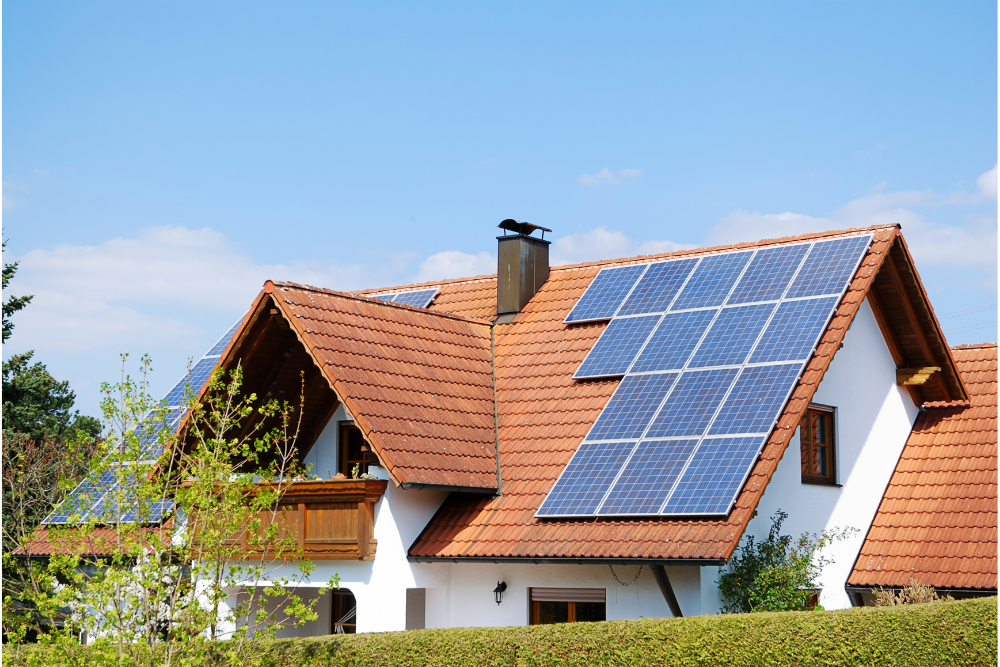Have you started to notice more solar panels appearing on your neighbors’ roofs while driving or walking through your neighborhood? Solar energy is increasing in popularity among homeowners, and for good reason. Homeowners are opting for solar panels in Arkansas to make their properties more energy-efficient and to help reduce their carbon footprint. If you’ve also been considering switching to solar power, read on as we’ll be discussing the top 14 benefits of solar energy for homeowners, which range from environmental advantages to financial gains.
1. Environmental Benefits
The environmental benefits of solar energy are two-fold. First, solar energy significantly reduces greenhouse gas emissions, as it minimizes our reliance on fossil fuels for generating electricity. Fossil fuels, like coal and natural gas, release large amounts of greenhouse gasses when they’re burned and contribute to climate change. Solar power, on the other hand, works by capturing energy directly from the sun, which eliminates the need for fossil fuels and, as a result, reduces the emission of greenhouse gasses.
Another benefit of solar energy is that it helps to conserve our natural resources. Unlike traditional power plants that use large amounts of water for cooling, solar power plants use very little water which helps to alleviate the strain on local water supplies. Solar energy also reduces our dependency on non-renewable energy sources, like coal, oil, and natural gas. These resources are finite and have the potential to run out over time, but by shifting to solar energy, we can lessen our reliance on limited resources to help create a more sustainable future for our planet.
2. Cost Savings
One of the primary reasons why many homeowners switch to solar energy is to lower their electricity bills. Solar energy greatly reduces reliance on the traditional power grid since it works by capturing the energy of the sun. This means that homeowners can generate their own electricity, reducing the need to purchase it from utility companies. As a result, their monthly utility bills go down significantly, which can free up their funds for other household expenses.
3. Return on Investment (ROI)
While the initial cost of installing solar panels in Arkansas may seem high, it’s essential to view it as an investment instead of an expense. Solar energy has incredible long-term financial benefits since homeowners can recover their initial investments by saving money on their monthly electricity bills.
Homeowners can also calculate the payback period before making their decision, which is the time it takes for the savings on electricity bills to equal the initial investment. Even beyond the payback period, solar energy will continue to generate savings. Additionally, through net metering or feed-in tariffs, homeowners can earn money by selling their excess electricity back to the grid, which further shows how switching to solar energy is a financially sound choice in the long run.
4. Energy Independence
As mentioned previously, a major benefit of solar energy is the reduced reliance on the grid. By generating their own electricity homeowners not only save money, but they also become more self-sufficient which can protect them from the fluctuating prices of electricity. During times when energy costs rise, having energy independence can mitigate financial strain.
Solar energy also offers a reliable power source during blackouts and emergencies. With battery storage systems, homeowners can store excess solar energy and use it when the grid is down, ensuring an uninterrupted supply of power when it’s needed the most.
5. Renewable and Sustainable Energy Source
Solar energy is a clean and renewable resource, which means it offers several benefits for the environment. Firstly, because the sun provides an abundance of sunlight, it is an endless and sustainable energy source. When we harness the energy of the sun, we significantly reduce our dependence on finite fossil fuels, which helps in preserving them for future generations.
Additionally, solar panels have a long lifespan, making them a reliable investment. They’re durable and dependable, built to withstand a wide range of weather conditions and to continue producing energy for many years. Environmentally conscious homeowners can greatly benefit from the combination of sustainability, longevity, and low maintenance that solar energy provides.
6. Government Incentives and Tax Benefits
Governments worldwide recognize the importance of transitioning to renewable energy sources, so they often offer incentives to homeowners who invest in solar installations. The Federal Investment Tax Credit (ITC) is one of these incentives, as it allows taxpayers to deduct a percentage of the cost of their solar system from their federal taxes, which reduces the overall expense of switching to solar. The ITC currently provides a 30% tax credit for residential and commercial solar installations. Property owners must have purchased and installed their solar energy system during the year that the tax incentive exists in order to be eligible for the ITC.
There are also various state and local incentives that further sweeten the deal, as they offer additional rebates, grants, and incentives to encourage homeowners to go solar. Keep in mind, it’s important to research region specific programs, as these incentives can vary depending on where you live.
7. Increased Home Value
Solar installations can also have a positive impact on property resale value. A report by the National Renewable Energy Laboratory shows that for every $1 you save on energy bills, the value of your home increases by $20. Another study by the U.S. Department of Energy’s Lawrence Berkeley National Laboratory found that environmentally conscious homebuyers are willing to pay an additional $15,000 or more for a home that’s powered by solar energy.
8. Job Creation and Economic Benefits
The rising popularity of solar energy has led to the creation of numerous jobs in installation, manufacturing, and maintenance, providing employment opportunities for a wide range of skilled workers. In addition to its many benefits for the environment and homeowners, solar panel installation also helps to increase local business activity and generate tax revenue, which can support economic growth.
9. Environmental Stewardship
Choosing solar energy is an act of environmental stewardship. By adopting solar energy, homeowners reduce their carbon footprint and take personal steps toward addressing climate change and preserving the planet and its resources for generations to come. This contribution to a sustainable future is incredibly important in the fight against the climate crisis.
10. Aesthetics and Design Integration
The aesthetics of solar panels have experienced significant advancements throughout the years, and they now offer a variety of options to cater to different architectural styles. With more choices available, panels can now seamlessly integrate with different home designs to enhance the home’s visual appeal instead of detracting from it. This allows homeowners to embrace solar energy without having to compromise on the aesthetics of their properties.
11. Educational Opportunities
Going solar also creates opportunities to educate children about solar energy, which can help shape a more sustainable future. By installing solar panels and introducing children to the concept of renewable energy, we can engage their curiosity and help them understand all of the benefits of solar power. When we stay open to questions and nurture younger generations to be well-informed and passionate about the environment, we take significant steps towards a more sustainable world.
12. Community Impact
When homeowners go solar, they become environmental leaders in their communities. Their decision to embrace sustainable practices can have a ripple effect, influencing neighbors and members of the community to consider going solar as well. Making decisions that have a positive impact on the environment and inspiring others to do the same can ultimately foster a sense of collective responsibility for sustainable living.
13. Social Responsibility
Switching over to solar energy is a powerful way to contribute to the effort for a cleaner planet. When homeowners take personal action to address climate change, they can inspire others in their orbit to embrace more sustainable practices and make a positive impact on a larger scale.
14. Resilience During Power Outages
Last but not least, battery storage systems allow homeowners to store excess solar energy and use it when power outages occur. This is an incredible advantage to using solar energy, as it will give you peace of mind and a feeling of safety in the case of adverse weather conditions and other emergencies.
Conclusion
There’s no denying that solar energy offers an abundance of benefits for homeowners which range from environmental advantages, to financial savings, and even community impact. If you want to be part of a movement that is making positive change for future generations and the world as a whole, we encourage you to embrace the advantages that come with clean energy and explore solar panel options in Arkansas.


